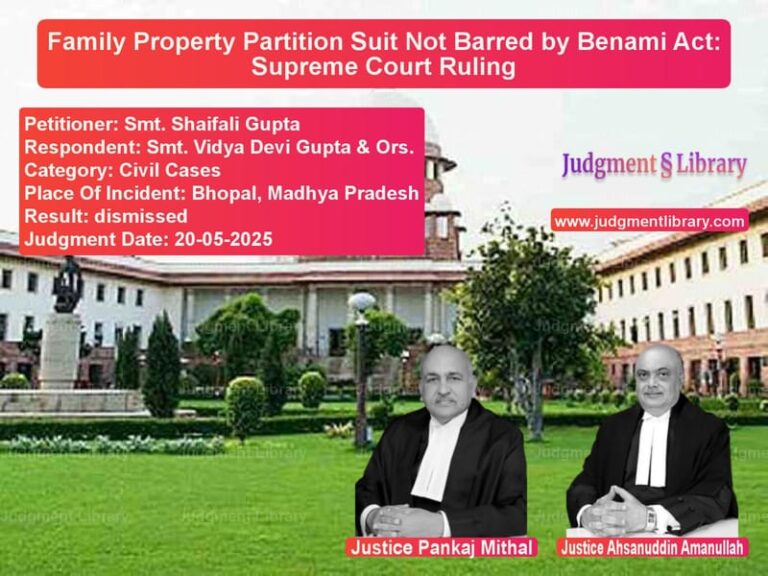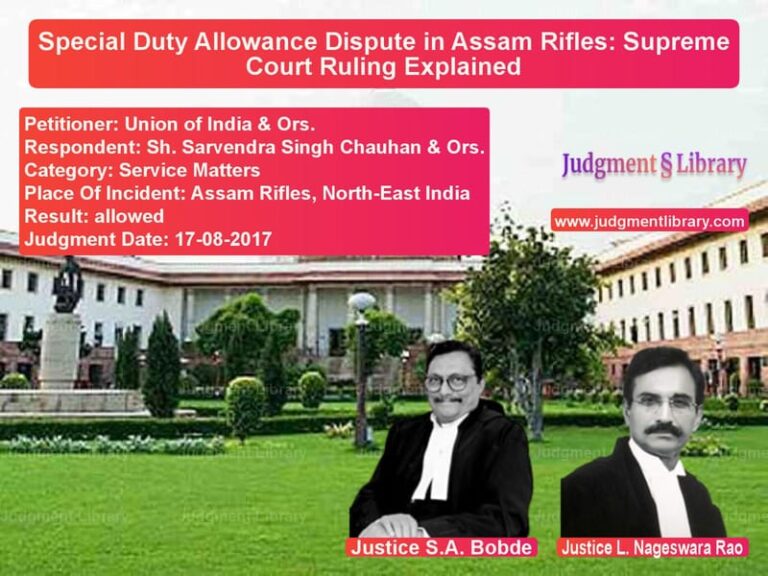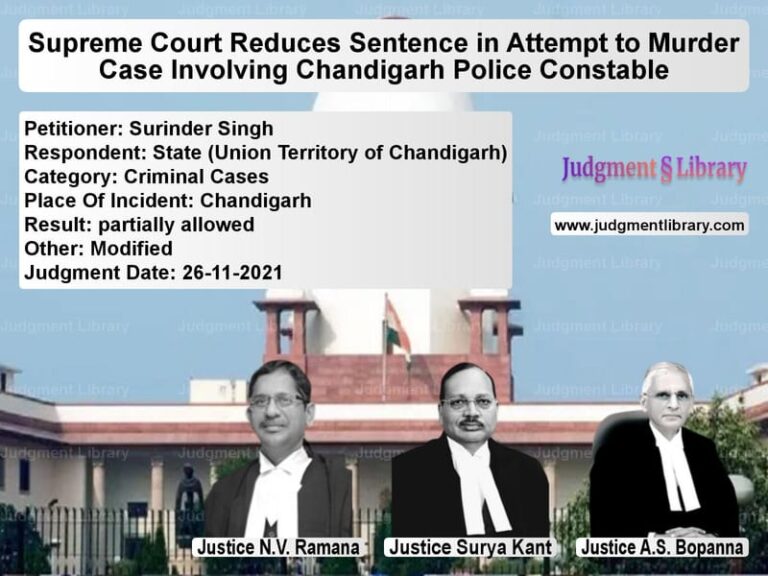Supreme Court Dismisses Review Petitions in Nirbhaya Case: Death Sentence Upheld
The case of Vinay Sharma & Anr. vs. State of NCT of Delhi & Ors. is one of the most significant criminal cases in Indian judicial history. It pertains to the brutal gang rape and murder of a 23-year-old woman, widely known as the Nirbhaya case, which occurred in December 2012 in Delhi. The Supreme Court was called upon to review its judgment upholding the death sentence of the convicts.
Background of the Case
On the night of December 16, 2012, Nirbhaya and her male companion boarded a private bus in South Delhi. Inside the bus, six men, including the driver, brutally assaulted both victims. The young woman was subjected to a horrific sexual assault and physical torture, including the use of an iron rod, causing grievous internal injuries. Both victims were then thrown from the moving bus, left to die on the roadside.
Following public outrage, the police swiftly arrested six suspects, one of whom was a juvenile. The trial court convicted the adult offenders and sentenced them to death in September 2013. The Delhi High Court upheld the convictions and sentences in March 2014. The Supreme Court also confirmed the death sentences in May 2017. However, two convicts, Vinay Sharma and Pawan Kumar Gupta, filed review petitions challenging the Supreme Court’s judgment.
Arguments Presented in the Review Petition
Petitioners (Vinay Sharma and Pawan Kumar Gupta)
- The death penalty should be abolished in India as it violates the principle of non-violence.
- The investigation was biased, and the accused were unfairly targeted by law enforcement agencies.
- The petitioners were not habitual offenders and should be given a chance to reform.
- The trial was unfair due to political and public pressure, leading to an erroneous judgment.
- The forensic evidence, including DNA reports and CCTV footage, was unreliable.
- One of the convicts, Vinay Sharma, was a minor at the time of the crime and should have been tried under the Juvenile Justice Act.
- The dying declarations of the victim were inconsistent and should not have been relied upon.
Respondent (State of NCT of Delhi)
- The Supreme Court had already conducted a detailed hearing and considered all evidence before confirming the death sentence.
- The petitioners’ arguments were a mere repetition of previously rejected claims.
- The forensic evidence, including DNA analysis, CCTV footage, and eyewitness accounts, conclusively established the guilt of the accused.
- The dying declarations were consistent and legally admissible.
- The contention regarding the accused’s age had been examined, and official records confirmed that Vinay Sharma was above 18 years at the time of the offense.
- The crime fell under the “rarest of rare” category, justifying the imposition of the death penalty.
Supreme Court’s Observations
The Supreme Court thoroughly analyzed the review petitions and found no new evidence or legal grounds to alter its earlier judgment. The key observations were:
- The death penalty remains a valid legal punishment in India as upheld in the landmark case Bachan Singh vs. State of Punjab (1980).
- The review petitions failed to present any error apparent on the face of the record, which is the primary ground for a criminal review.
- The arguments regarding forensic evidence and CCTV footage had been previously examined and found credible.
- The trial court, High Court, and Supreme Court had all independently evaluated the evidence and reached the same conclusion.
- The plea for reconsideration of the death penalty was a matter for the legislature, not the judiciary.
Final Judgment
On July 9, 2018, the Supreme Court dismissed the review petitions filed by Vinay Sharma and Pawan Kumar Gupta. The Court upheld its previous judgment confirming the death penalty for the convicts.
The judgment reaffirmed the principle that justice must be served in cases of extreme brutality, particularly crimes against women. It also emphasized that the judicial process had been fair and thorough, leaving no room for doubt regarding the guilt of the accused.
Implications of the Judgment
The Supreme Court’s decision in this case has several important implications:
- It reaffirms the legal precedent that the death penalty can be imposed in cases of extreme brutality.
- It highlights the reliability of forensic evidence, including DNA analysis and CCTV footage, in criminal trials.
- It strengthens the judiciary’s commitment to justice in cases of sexual violence.
- It sets a benchmark for expeditious trials in cases of heinous crimes.
The ruling in this case ensures that the principle of justice is upheld while reinforcing the need for strict punishment in cases of extreme crimes.
Petitioner Name: Vinay Sharma & Pawan Kumar Gupta.Respondent Name: State of NCT of Delhi & Ors..Judgment By: Justice Dipak Misra, Justice R. Banumathi, Justice Ashok Bhushan.Place Of Incident: New Delhi, India.Judgment Date: 09-07-2018.
Don’t miss out on the full details! Download the complete judgment in PDF format below and gain valuable insights instantly!
Download Judgment: Vinay Sharma & Pawan vs State of NCT of Delh Supreme Court of India Judgment Dated 09-07-2018.pdf
Direct Downlaod Judgment: Direct downlaod this Judgment
See all petitions in Rape Cases
See all petitions in Bail and Anticipatory Bail
See all petitions in Juvenile Justice
See all petitions in Judgment by Dipak Misra
See all petitions in Judgment by R. Banumathi
See all petitions in Judgment by Ashok Bhushan
See all petitions in dismissed
See all petitions in supreme court of India judgments July 2018
See all petitions in 2018 judgments
See all posts in Criminal Cases Category
See all allowed petitions in Criminal Cases Category
See all Dismissed petitions in Criminal Cases Category
See all partially allowed petitions in Criminal Cases Category







